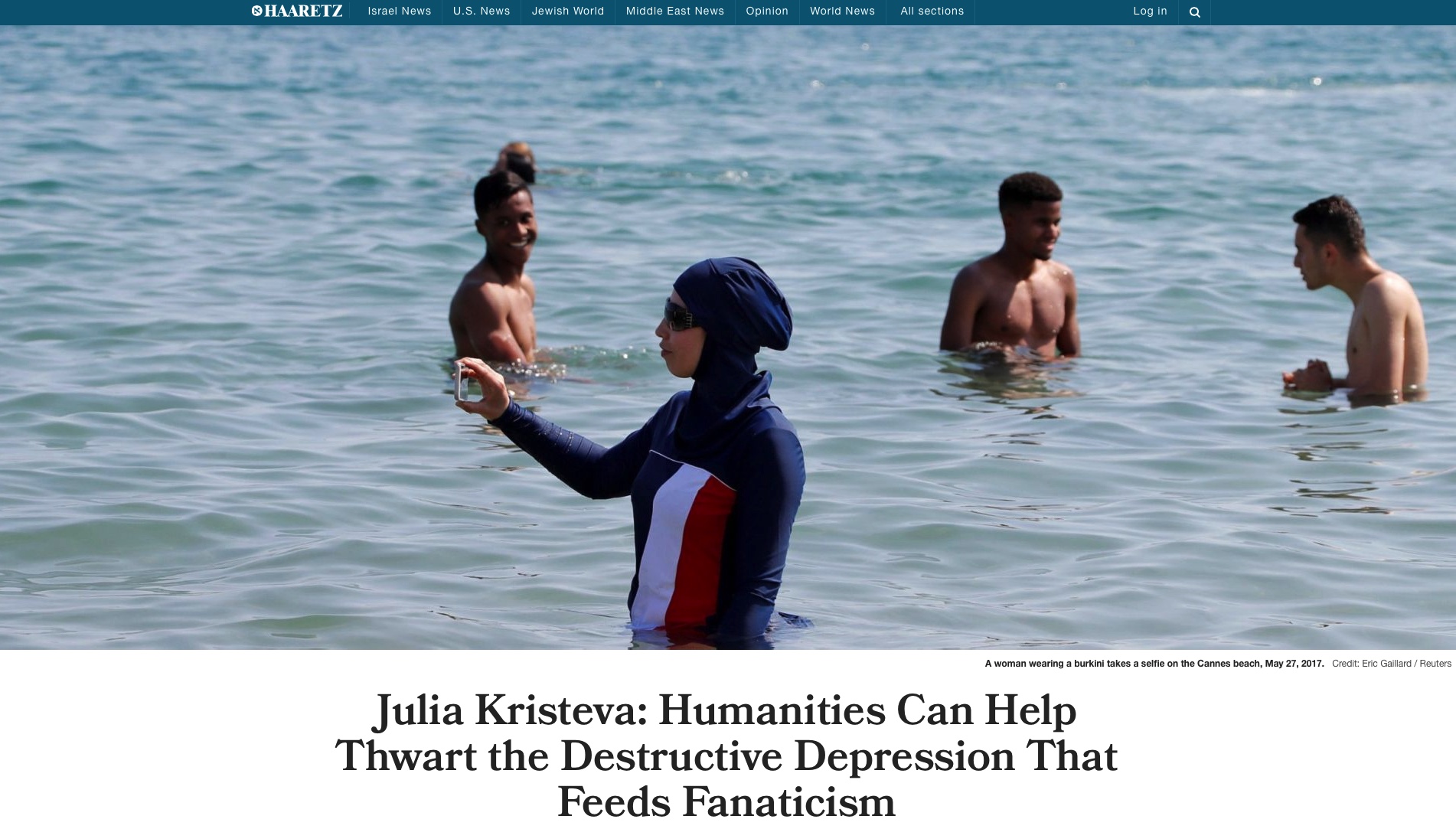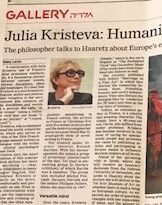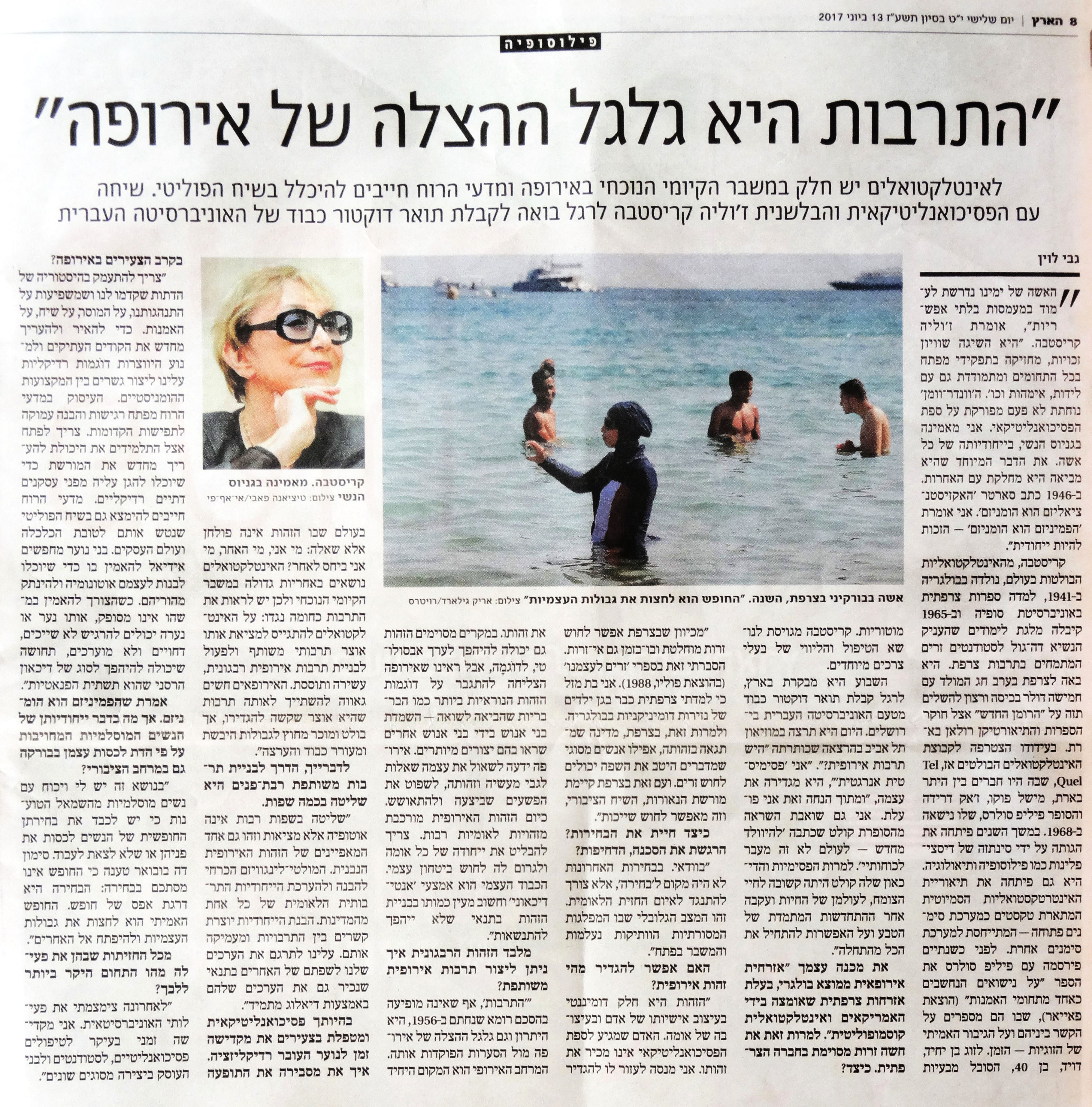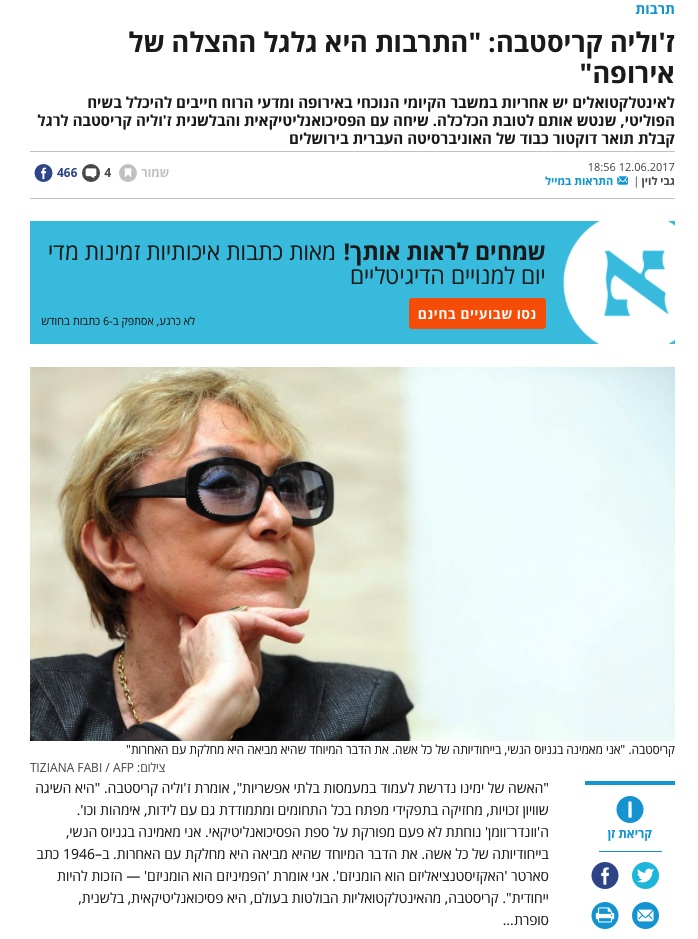Julia Kristeva: The humanities can help thwart the
destructive depression that feeds fanaticism
ז'וליה קריסטבה: "התרבות היא גלגל ההצלה של אירופה"
לאינטלקטואלים יש אחריות במשבר הקיומי הנוכחי באירופה ומדעי הרוח חייבים להיכלל בשיח הפוליטי, שנטש אותם לטובת הכלכלה. שיחה עם הפסיכואנליטיקאית והבלשנית ז'וליה קריסטבה לרגל קבלת תואר דוקטור כבוד של האוניברסיטה העברית בירושלים

https://www.haaretz.co.il/gallery/.premium-1.4165667
http://www.haaretz.com/world-news/europe/.premium-1.795544
The celebrated Bulgarian-French
philosopher talks to Haaretz about Europe's
existential crisis in which business and economics have supplanted the
humanities
Gaby Levin
A conversation with Julia Kristeva,
one of France’s most prominent intellectuals, is a fascinating journey between
current events, various disciplines, ideas and languages. It’s clear that
Kristeva is a psychoanalyst, linguist, author and philosopher receptive to her
environment who connects all the disciplines and worlds in a process she calls
“Je me voyage” (using a reflexive verb that can mean “I am my journey” or “I
travel myself”). Kristeva, who is esteemed around the world, coined the term,
which also serves as the title of her 2016 French-language memoir written as a
dialogue with the writer and clinical psychologist Samuel Dock.
Kristeva says the exact translation of this concept — which defines her
more than anything — challenges translators in many languages: English,
Italian, Hebrew. Kristeva is constantly on the move,
both intellectually and geographically as one. Even in a phone conversation
with her you get the impression of the flow and crossing of bridges that she
often mentions – bridges between identities, religions, historical and
cultural periods, and especially people.
A conversation with her demands maximum alertness in order to follow the
transitions from idea to idea, from topic to topic, and to be convinced that in
the end her thinking is coherent and sharp, packed and rich with contexts taken
from European culture, history, philosophy and the rest of the humanities that are
so close to her heart. And despite my alertness and excitement — because after all this is the celebrated Julia
Kristeva — she radiates warmth and is pleasant and open, perhaps thanks
to her Slavic roots, perhaps thanks to the humanity that characterizes her
worldview.
She was born in Bulgaria in 1941, studied French literature at the University
of Sofia and received a scholarship in 1965 that French President Charles de
Gaulle awarded students specializing in French culture. She arrived in France
on Christmas Eve with five dollars in her pocket and the desire to complete her
thesis on a post-World War II, avant-garde style of novel-writing in France.
She studied under literary theorist Roland Barthes. With his encouragement she
joined a group of prominent intellectuals of the day, Tel Quel (a pioneering group in literary criticism), of which Barthe was a member. The group also included Michel Foucault, Jacques Derrida and the
author Philippe Sollers, whom she married in 1967.
Over the years, Kristeva developed her ideas by synthesizing disciplines like
philosophy, theology, linguistics, semiotics and psychoanalysis. She also
developed a theory of semiotic intertexuality, which views texts as an open
symbolic system that relates to another system of symbols. She is a professor
emeritus at Paris Diderot University and a tutelary member of the Paris
Psychoanalytic Society. She has long been a visiting professor at Columbia
University, where she first taught in 1970, and where she shared a chair with Tzvetan Todorov, a fellow
Bulgarian expatriate, and Umberto Eco. (Todorov died
last year and Eco died in February.)
Kristeva has published many books on philosophy, theology, literary criticism
and politics, but also novels like “The Samurai,” which is her reply to the
1954 novel “The Mandarins” by Simone de Beauvoir. Other Kristeva novels include
“Murder in Byzantium,” “Teresa, My Love” and “L’Horloge enchantée,” which is due out in English as “The
Enchanted Clock” this December. Many of her works have been translated into
Hebrew as well.
She recently published with Sollers “Marriage as a
Fine Art” in which they discuss the connection between them, friendship,
honesty and each’s independence. They also discuss the dialogue they've conducted for 50 years and time as the real
hero of intimacy.
Sollers, an esteemed author in France, is a colorful
and amusing character. The couple have a 40-year-old
son, David, who suffers from motor problems. Kristeva has become involved in
the issue of caring for special-needs people and promotes the cause by
publishing articles and participating in forums meant to influence
decision-makers at all levels.
Ahead of her upcoming visit to Israel, where she will receive an honorary
doctorate from the Hebrew University of Jerusalem, she spoke to Haaretz about the lecture she will deliver at the Tel Aviv
Museum of Art on whether there is such a thing as European culture. As
expected, my order of questions changes with her explosions of ideas, and the
answer to one question can actually be found in the answer to another —
constant movement, flow and renewal.

Kristeva calls herself “an energetic pessimist,” so I go to work based on this
assumption. “I also derive inspiration from the novelist Colette, who wrote,
‘To be reborn has never been too much for me,’” she says. Despite Colette’s
pessimism and depression, she was attentive to plant life, to the world of
animals, and followed the constant renewal of nature and the possibility of
starting everything over.
You call yourself
a European citizen of Bulgarian origin, a French citizen who was adopted by the
Americans and sees in herself cosmopolitan
intellectuality. Despite this, you say you still partly feel you're a stranger
in French society, similar to Hannah Arendt, who felt she was a stranger in
American society. How do you explain this?
“I explain that in France you can feel you’re a total stranger and
simultaneously not a stranger. I explained it in my book ‘Strangers to Ourselves.’ I’m lucky because I studied French in a Dominican
nuns’ school in Bulgaria and I knew French by the time I arrived in France at
age 24. And despite this, in France — which is a country proud of its
heritage — even my kind of people, who speak the language well, can feel
they’re strangers. And yet there is a heritage of enlightenment, the public
discourse in France, and this lets you feel involvement, belonging.”
How did you experience the recent elections? Did you feel danger, urgency?
“Of course, there was no room for a choice in the recent elections, rather a
need to oppose the threat of the National Front. It’s not an exceptional
situation, but rather the global situation in which the old, traditional
parties are disappearing and crisis is at the door.”
The theme of the meeting at the Tel Aviv Museum will be “Is there a
European culture?” What is the image of Europe now? Can one define European
identity before speaking about culture?
“Identity is a dominant part of shaping a person’s personality; so it is with
shaping a nation. The person on the psychoanalytic couch doesn’t know his
identity. He is hurt, destroyed, defeated, and I, as a psychoanalyst, try to
help him define his identity — female, male, Jewish, Muslim, Catholic,
homosexual, heterosexual, and so on.
“In certain cases, identity can also turn into an absolute value, into a dogma,
but we have seen that Europe overcame the worst examples of identity like the
barbarity that begat the Holocaust, the destruction of human beings by other
human beings who viewed them as superfluous. Europe knew to ask itself
questions about its deeds and identity; it knew to judge the crimes that it
committed and to recover.
“Today, European identity is comprised of many national identities. Europe
needs to be federal — made up of different nations that are open to one
another and respect one another. I believe that there is a need to highlight
the uniqueness of each nation and make it feel self-confident. Self-respect is
an antidepressant, and it as important as it gets in building identity, but on
condition that it doesn’t turn into arrogance but rather openness to the other.
That national self-respect will allow nations to create a rich, heterogeneous
European identity in which each has its own uniqueness, language and culture.”
Besides heterogeneous identity, how
is it possible to create a joint European culture?
“Culture — although it does
not appear in the 1957 Treaty of Rome — is Europe’s advantage and
lifesaver in the face of all kinds of storms striking it. The European space is
the only place in the world where identity is not a cult but rather a question:
Who am I, who is the other, who am I relative to the
other?
“These questions originate in Greek-Judeo-Christian culture, from which
European culture is nurtured. In Platonic philosophy, every idea, every value
is built through eternal dialogue. The intellectuals bear the biggest
responsibility for the current existential crisis, and so we should see culture
like a wall against it. Intellectuals have to strive to find that joint
cultural treasure and move to build a heterogeneous, rich and vibrant European
culture. Europeans feel pride in belonging to that culture, which is a treasure
hard to describe, but it’s prominent and recognizable from outside the border
of the continent and arouses respect and admiration."
You’ve said the
way to building a multifaceted, joint culture is multilingualism.
“I am full of admiration for European students who participate in the Erasmus Programme [an exchange program among 25 European countries]
who speak many languages. I have a Swedish student who speaks fluent English,
takes courses in French about female genius and is also studying Chinese.
Having a command of many languages isn’t a utopia but rather a reality, and
it’s also one of the characteristics of the constructed European identity.
“Multilingualism — translating the national cultural treasures — is
necessary to understanding and appreciating each country’s national cultural
uniqueness. Understanding the uniqueness creates relationships between the cultures
and deepens them. In the end, ‘respecting’ uniqueness is the basis of human
rights, the genius of each that can be shared with the other. We have to
translate our values to the language of others on condition that we also
recognize their values — and that comes through continuous dialogue.”
As a psychoanalyst and caregiver for the young you dedicate time to youths
who go through a radicalization process. How do you explain the phenomenon
among youths in France and in Europe in general?
“I think you have to go deep into the history of religions that preceded us and
influence our behavior, ethics, discourse and the arts. To enlighten and
reevaluate the ancient codes and prevent the
creation of radical examples, we have to create bridges between the humanities
disciplines: the history of religions, sociology, philosophy, art history and
literature.
“Engaging in the humanities develops sensitivity and a deeper understanding of
ancient beliefs. You have to teach the students to ask questions about the ideas
or the arts that their parents brought – consciously or unconsciously.
You have to strive to develop among them the ability to reevaluate heritage in
order to defend it against purveyors of radical religions.
“I think studying humanities is a way of preventing a cracking of the
foundations of civilization and even humanity. The humanities also have to be
found in the political discourse that discarded them in favor of economics and
the business world. Modern fanaticism attracts youths with a fragile psychological
makeup.
“In contrast to other children who are curious and want to know, these youths
look for an ideal to believe in so they can build autonomy and disengage from
their parents. When the need to believe in something is
insufficient, that boy or girl can feel they don’t belong, rejected and
unappreciated, a feeling that can turn into a type of destructive depression
that’s the basis of fanaticism. We need educators, teachers and
guardians who can create the bridges between humanism and diversity, a kind of
Marshall Plan of knowledge and diversity.”
As the writer of a trilogy on female genius — about the author
Colette, the philosopher Hannah Arendt and the Austrian-British psychoanalyst
Melanie Klein — how do you define contemporary feminism?
"The feminist movement that began with the suffragists in the late 19th
century continued with Simone de Beauvoir in the 1950s. She spoke of equality
between women and men. And still, after all the achievements, the woman of our
day is required to endure impossible burdens. She achieved equal rights, holds
key positions in all fields and also deals with births, motherhood, etc. The
“Wonder Woman” more than once ends up broken on the psychoanalytical couch. I
believe in female genius, in the uniqueness of every woman. She shares with
others the special thing that she brings. Sartre wrote in 1946 ‘Existentialism
is humanism.’ I say, ‘Feminism is humanism’ – the right to be unique.”
But what about the uniqueness of Muslim women who are required by their
religion to cover themselves with a burqa, a veil, in the public space?
"I have a disagreement on this issue with Muslim women from the left who
contend we have to honor women’s free choice to cover their faces or not to
work. I want to recall here Simone de Beauvoir, who argued that freedom does
not end with choice. Choice is the starting point of freedom. True freedom is
crossing selfhood borders and opening up to others."
Of all the fronts on which you’re active, which field is closest to your
heart?
"I recently cut back my university activity. I also retired from running
the Simone de Beauvoir Prize for the freedom of women, which I founded in 2008
on the occasion of her 100th birthday. The prize took off and I’m no longer
necessary. I dedicate myself mainly to psychoanalytical treatments, to
patients, to my students and of course to my son David, who’s busy creating all
sorts of things.”
Haaretz
By Gaby Levin, Jun 15, 2017




